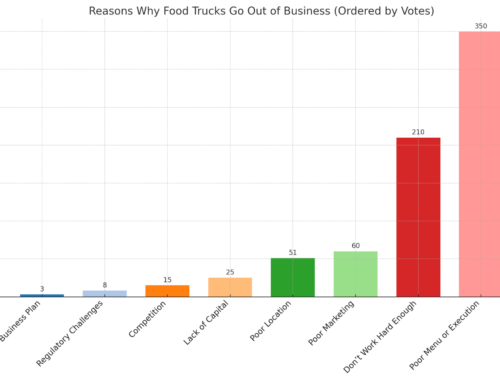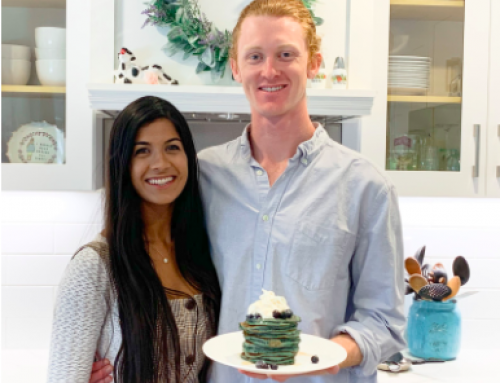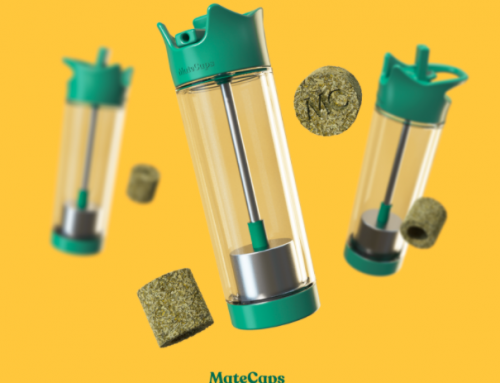Hello! Who are you and what food business did you start?
My name is Mark Overbay, and I’m the co-founder and president of Durham, NC-based Big Spoon Roasters, a maker of small-batch, handcrafted nut butters and snack bars.
We believe that our food choices matter a great deal, and our mission is to help people build healthier relationships with our planet through delicious, nutritious foods made without compromise.
Big Spoon Roasters sets three important standards in our categories:
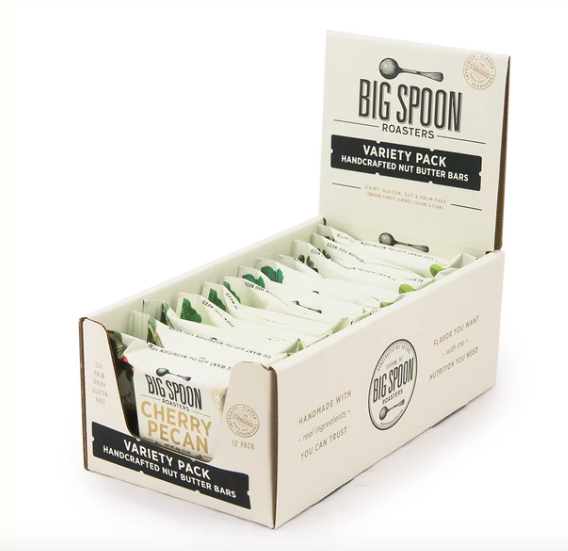
Integrity: We source small lots of the finest ingredients directly from local and like-minded people we know and trust. In short, each and every one of our ingredients is thoughtfully sourced and represents the world’s best-in-class.
For instance, we only use certified bee-friendly heirloom Mission variety almonds, ginger grown by a single grower cooperative on the island of Fiji, and peanuts from a fourth-generation traditional farm.
Flavor: In the hands of our skilled food artisans, this level of ingredient quality leads to exceptional natural flavor, which we never mask with artificial additives or preservatives. We carefully taste each batch before packaging it to make sure it meets our exacting standards. Every nut butter we make offers intense, identifiable flavors of fresh-roasted nuts and a subtle balance of saltiness and sweetness.
Freshness: Our small batches of nut butter are handmade to order, offering the incomparable quality of just-made food.
What are your ballpark monthly or annual revenue numbers?
We don’t publicly share revenue numbers, but we’ve sustained 20+ percent growth every year, and this year we’re up 40% over 2018.
What’s your backstory?
A lifelong peanut butter lover, I received my first lesson in handcrafted nut butter in 1999 while living in a rural farming community in Zimbabwe, where I was a Peace Corps Volunteer.

After harvest, peanuts were roasted over an open fire and ground by hand between stones as coarse salt was added to taste. Attempting to recreate the roasty-salty-sweet peanut butter I missed from home, I experimented with adding local honey, coconut oil, and sea salt to the coarse butter. The deliciously fragrant, mouthwatering result was a revelation.
The experience of fresh, handmade peanut butter I had in Zimbabwe was special for a number of reasons. First of all, the flavor beyond any expectation I ever had for peanut butter. Having eaten many brands of peanut butter, including every “natural” and “organic” brand I could find, growing up, I naively thought that I had tasted the spectrum of flavors peanut butter had to offer. I was wrong.
The version I made in Zimbabwe offered a more intensely mouth-watering interplay of roastiness, sweetness, and saltiness carried by a uniquely coarse texture—created by pounding the fresh-roasted peanuts in a mortar and pestle—that made the peanut butter more toothsome, yet still spreadable. Even if this peanut butter experience had not created a spark of thought and inspiration, and it did, it would still be one of my favorite memories.
Related Reading: How I Started a $75k/Month Vegan Cookie Business with My Mom
Beyond the taste, my experience with peanut butter in Africa made me think more critically about food, cooking, and especially the production packaged foods in the jars and containers that line our pantries. Here was an undeniably sublime version of what most Americans would consider a satisfying, yet relatively ordinary pantry staple: peanut butter. In my world, peanut butter had always been thought of as an inexpensive “kids’ food,” a simply filling convenience food, in ingredient in candy, or a food for indulgent adults reliving the tastes of their childhoods.
What I tasted in Zimbabwe was simply an amazingly delicious food, and no other categories needed apply. It did not take much of a logical leap to realize that the incredible flavor of that handmade peanut butter came from not only the quality of the fresh ingredients, but also the care and craft that went into hand harvesting the peanuts, sorting them, roasting them over open fires, pounding them with stones, and then mixing them with honey, salt, and coconut oil.
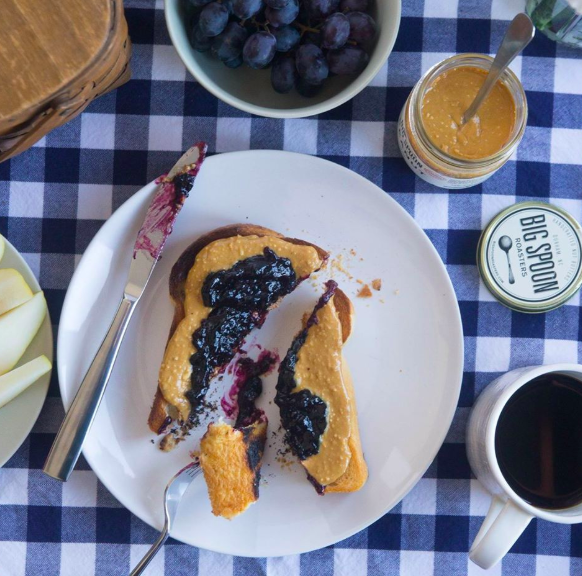
That peanut butter made me think, “Why can’t everything in our pantries be this good?” 10 years later, I sought to answer that by starting Big Spoon Roasters with my then-girlfriend, now-wife Megan.
She had been making delicious homemade, peanut butter-based energy bars for years because commercial bars out there are frankly not very tasty or healthy. When I started making nut butter, my nut butters became the base for her bars.
When we realized that, like my nut butters, there was no fresh handmade equivalent of her bars on the market, we decided that both categories of products should be parts of the business.
We launched the business in January 2011 at an outdoor cyclocross race in Orange County, NC, and began official selling that spring at a local farmers’ market.
Take us through the process of developing and producing your first nut butters.
My ideal way to make and sell nut butter would be to roast a small pan of nuts, mill them into a coarse butter, mix in small amounts of salt and honey, and serve it, still warm, to a waiting nut butter lover. That business model is obviously not doable at any reasonable scale, so we do the next best thing by making every batch to order, offering our customers the freshest nut butters possible unless they made it themselves.
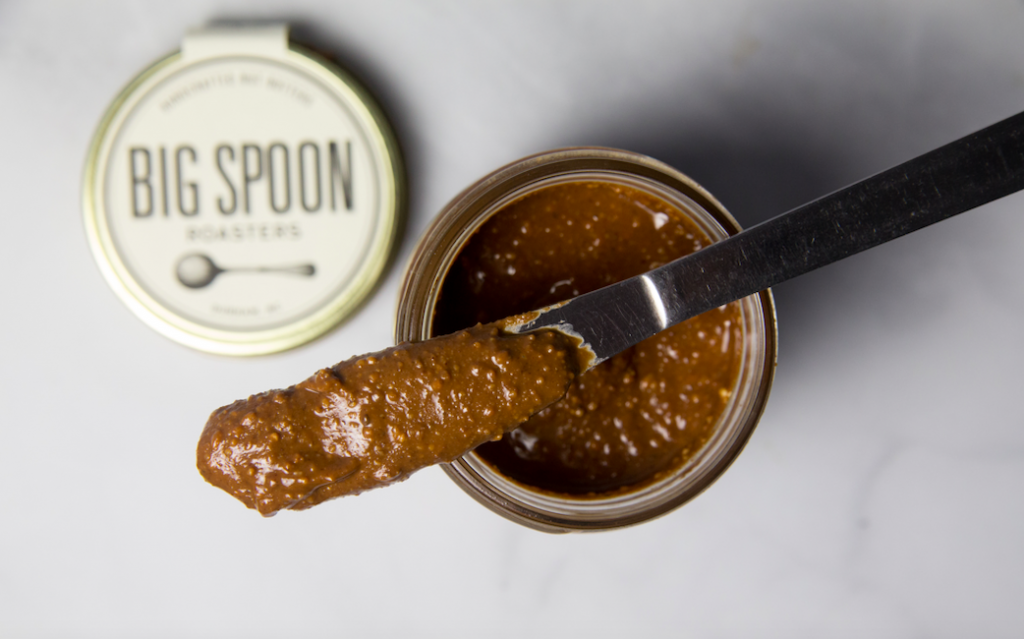
I follow my instincts, try not to pay attention to food industry trends and focus instead on what inspires me and our team of employees to be our best every day.
If we focus on the quality we produce in every moment, we’ll stand the best chance of achieving our goals. In terms of developing new recipes, we simply make things that we love to eat.
There is no roadmap or blueprint for starting a small nut butter or bar business, so we’ve figured out every detail of our production process along the way. In the early days, I roasted every nut on sheet pans in an oven, milled them in a tabletop nut mill that I modified, and filled every jar using literally tablespoon and canning funnel.
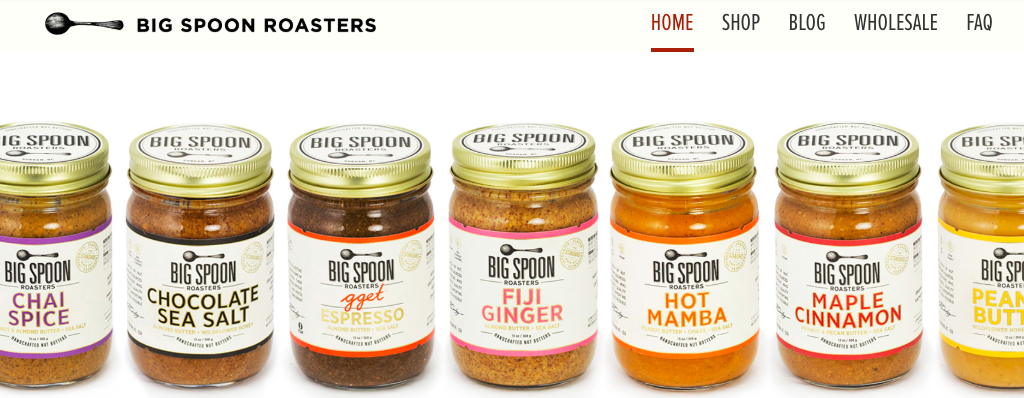
We’ve grown since then, obviously, and have invested in some equipment that reduces the physical strain of our process, but we still have an extremely manual process that relies heavily on human hands and senses. I think you can taste that attention to detail and quality in every batch.
Describe the process of launching Big Spoon Roasters.
We spent a couple of months in fall of 2010 working on four nut butter recipes and two bar recipes. Once we had those where we wanted them, we just need to figure out packaging. Simple: glass jars, metal lids, paper labels for the butters and foil-lined kraft paper pouches for the bars.
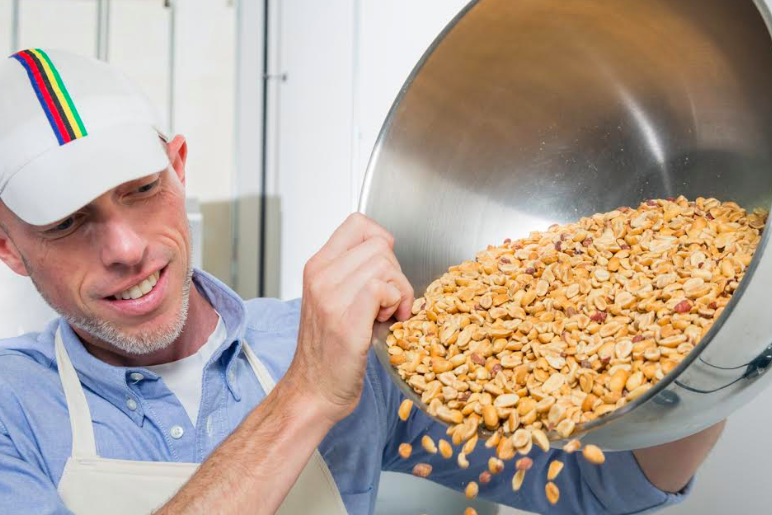
There were more than 50 applicants for a single spot in the 2011 Carrboro Farmers’ Market, and we were lucky enough to earn that spot. It was the ideal place to launch our business to the public. The market was (is) a thriving collection of farmers, food artisans, bakers, and crafters who take pride in offering some of the best foods in the country.
Related Reading: How I Sold Over 1 Million Protein Bars
The market was open 7am to noon every Saturday and for a few hours on Wednesday evenings. We didn’t miss a market day for the first two years and built a strong, organic following in our community.
We used personal savings to invest in graphic design work for our logo, which was the first and most important money we spent. Since our business is, in many ways, a reaction to the over-industrialization, over-commodification, and over-homogenization of the food industry, I wanted our brand identity to feel pre-digital. It should represent technologies like letterpress, etching, and stamping, not Photoshop.
Personal savings also went into our first nut mill and ingredient purchases. From there, we used farmers’ market sales to fund more ingredient and packaging purchases.
I kept my job at a coffee company for a year, worked every evening in the rented corner of a friend’s bakery, picked up takeout for me and Megan most evenings, and spent the last hour before sleep labeling jars. A big night was 48 jars of production. To this day, we have still not taken any outside investment.
I left my day job in May 2012 to focus on Big Spoon Roasters, and I immediately set out to locate a space to lease for both production and office space. It took almost a year of working out of bakeries and commissary kitchens, but we finally moved in to our first dedicated home in June 2013. We’re still in same building, but we’ve expanded four times since then.
Since launch, what has worked to attract and retain nut butter customers?
The number one thing any business can do to attract and retain customers is make a great product. Sounds obvious, right? One would think so, but I see too many products come to market that are just following trends or compromising on quality, sustainability, transparency, or all three.
By great, I mean impeccable quality, and in our world that means taste and texture. Great also means being well-defined and confident in who we are. We know what makes us different and communicate those attributes with clarity and transparency.
Big Spoon Roasters represents a set of values and a set of methods that translates those values into the products we make. One of our challenges is to make sure those values are clearly communicated. For example, we are a cruelty-free business; none of our cleaning products are tested on animals.
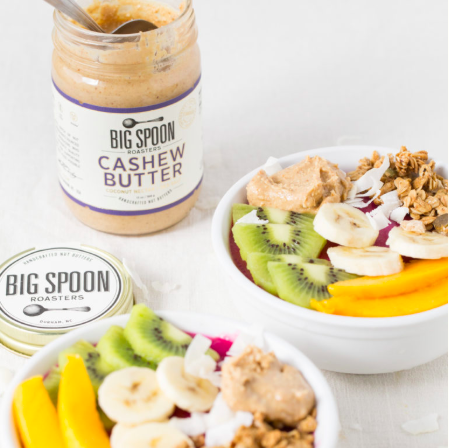
We’re also a proud member of the Living Wage community and pay our employees above living wage standards in our community and offer a competitive suite of benefits that include full dental and vision insurance, subsidized health insurance, local food CSA reimbursement, gym membership reimbursement, a free jar of nut butter every week, profit-based bonuses, and more.
On any given day, if there is any aspect of our work that feels compromised, less than our best, or somehow off; we stop and start over. We make it again. And again and again and again. We of course work hard at marketing as a form of storytelling to share our narrative with those that resonate with our work and values.
We have social media accounts and appreciate the connections they help us build with people all over the world. We use an email newsletter service that customers seem to appreciate. Both bars and nut butters are sold on our own ecommerce site and via Amazon Prime, but the majority of our business is wholesale to natural grocers and specialty retailers.
What does the future look like?
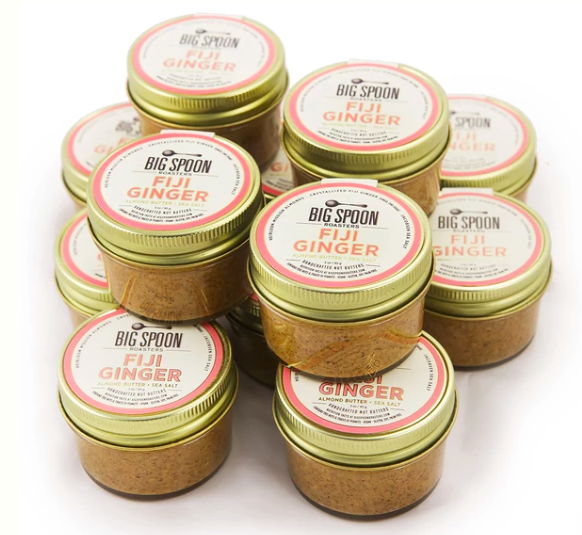
Nine years in, and every year has been better than the last. We’re having our best year ever, and we’re incredibly grateful for that. We are profitable but we take nothing for granted.
Most of our distribution is direct to retailers, but we work with several terrific regional distributors who help us get our products where they need to be.
Operationally, we’re made up of two people in senior management, a marketing & communications manager, an inside sales & customer service representative, a fulfillment coordinator, six full-time production people, and several regional field reps and brand ambassadors.
Our goal is to continue to grow and continue pushing what is possible in terms of quality and sustainability in our category of business.
We’re still so small. Nut butter is hundreds of millions of American households, and we’re in a relative handful of pantries. The future is bright as long as we focus on the values and methods that define our work.
What have you learned through starting this business?
Price based on the costs of production, not what you think the market can bear.
Karma is real. Be kind.
What are the “must have” tools for your business?
Favorite tool: Digital scale. Recipe precision and consistency are so important.
Close 2nd: Silicone spatula. We strive for zero waste and scrape every bowl clean before washing it.
Any influential books or podcasts that have inspired you?
Let My People Go Surfing, Yvon Chouinard: How to make good business run on values.
Building A Great Business, Ari Weinzweig: Fundamentals.
On Food & Cooking, Harold McGee.
In Our Time, Ernest Hemingway: The best food writing in the English language, still.
Advice for other food business founders?
Be passionate, tenacious, and energetic in your work; or find different work that inspires you to be passionate, tenacious, and energetic.
If you don’t think the world needs, truly needs what you’re making, don’t make it. Make something else.

